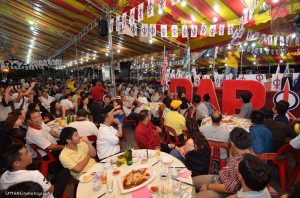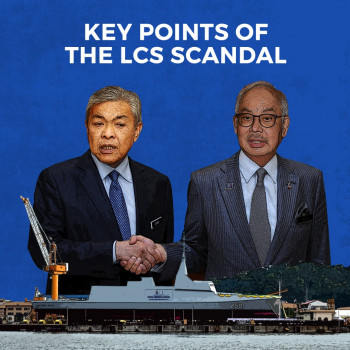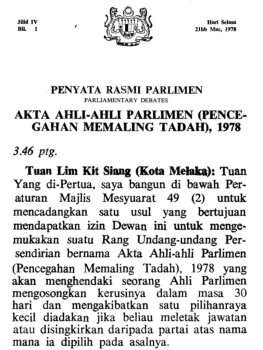Four years on from March 2008, many Johor folks are ruing for their overdue political change. Is the BN’s fixed deposit state in danger? The Rocket received a wide range of views, but one thing is certain, it’s no longer business as usual for the ruling coalition.
Shaking Ground
Since the 2008 general elections (GE) and BERSIH 3.0 rally, the political temperature throughout the country has kicked up several notches. Johor, which had comparatively missed out on the 2008 political quake, is buzzing with non-stop political campaigning, especially for PR.
PR’s ceramahs and events have been well attended. According to Skudai ADUN Dr Boo Cheng Hau, many of their ceramahs and fundraising dinners have seen very good turnouts.
“In Taman Molek, we had a record 3,000 over people turning out for our fundraising dinner and also more than 2,000 people in our dinner events in Kulai and Batu Pahat, which is MCA party president Chua Soi Lek’s hometown and stronghold.”
Not only has PR drawn the Chinese crowds, many Malays and Indians have been coming out too. “In the Malay-majority area of Pasir Gudang, we had a joint PR Merdeka Rakyat ceramah event that attracted more than 5,000 avid listeners in April,” Boo grinned.
“In the BERSIH 3.0 protests held in Johor Bahru (JB) on 28 April, close to 10,000 protesters from various races came out for the rally, unheard of for Johor. Many were young people and also working in Singapore.”
Chinese first off the block
The enthusiasm is most discernible in the Chinese ground. Some media reports have circulated that internal BN polls show that up to 80 percent of the Chinese voters in Johor will support PR in the coming general election (GE).
In the past Johor voters, typically the Chinese had a cautious voting preference, preferring a wait-and-see attitude of political change in other states.
 But now things have changed, Boo believes. “With the PR’s honest and sterling performance in the states it runs, especially in Penang and Selangor, there is now less hesitation for them to tack on the wave of change,” he said.
But now things have changed, Boo believes. “With the PR’s honest and sterling performance in the states it runs, especially in Penang and Selangor, there is now less hesitation for them to tack on the wave of change,” he said.
“In the past the Chinese tended to vote opposition candidates as a protest votes against BN. This time they are looking at establishing a two-party system for the betterment of Malaysia.”
BN’s favourite scare-mongering campaign seems to have little effect on the Chinese here. Despite incessantly harping on the Islamic state and hudud law issues during the Tenang by-elections, almost 70 percent of the Chinese voters supported the PAS candidate.
“One must bear in mind that these are rural area voters with little access to Internet or alternative media; furthermore it is MCA’s support heartland and Chua Soi Lek’s former constituency. BN’s slandering and bribing tactics is not working amongst the Chinese anymore.”
In part it is also due to the close cooperation amongst PR parties, especially PAS and DAP. “DAP and PAS leaders have been working closely since the late 1990s. We have a good rapport with each other,” he continued.
Breaking Down The Numbers
Demographically, Johor is similar to Selangor. Johor has many mixed seats where no race dominates outright. Out of the 26 parliamentary seats, only five seats are 70 percent or more Malay-majority in nature.
In the past, EC had gerrymandered the seats to be mixed in nature as BN had the upper hand in mixed seats then. In the last GE however, PR won the majority of the mixed seats, especially urban ones. That has sparked the buzz that PR will win more seats in Johor.
“Currently we believe PR has a 45 percent chance of forming the state government here. BN’s internal survey show at least 13 parliamentary seats in danger, with four to five listed as black seats,” Boo said.
Of interest are 14 urban and mixed parliamentary seats (click here to see table-Johor electorate analysis). With a high percentage of non-Malays voters and internet and alternative media access (for the urban seats), PR’s chances -on paper- are brighter there.
“UMNO is more concerned about its seats here than they are for their component parties’ (MCA, Gerakan, MIC) seats. Johor is UMNO’s birthplace; losing the state or more seats is a battering they can’t afford as it may hasten a domino effect on the change of government,” he elaborates.
“Before 2008, PR only had two state seats in Selangor. Right now in Johor, we have six DUN representatives. That stands well for PR.”
“With the ripening political conditions, beginning with Chinese vote change, we may even witness the political tsunami beginning from Johor. I am optimistic for our future.”
Norman Fernandez, Johor DAP state deputy chairman, however takes a cautious stance. “It will be tough to form the state government, but we are confident of winning more seats.”
Fernandez sketches the factors that may affect the outcome for PR. “The presence of young and new voters is a wildcard for Johor and Malaysia as well. An estimated 25 percent of the electorate will be voting for the first time in the next GE.”
“Those working overseas especially in Singapore have different voting perspective as a result of the Singapore general election (GE) last year. BN, especially UMNO is worried about its seats here. It’s no coincidence we are seeing disruption to PR’s ceramahs.”
However, there is no substitute for hard work. Bakri MP Er Teck Hwa tells how he is slowly winning over DAP’s bane, the Malay electorate, with dedicated effort.
“In Bukit Naning where there’s nary a Chinese in sight, I often mingled with the Malay villagers personally to win their acceptance. With the Malays one can’t put up airs or just give ceramahs and expect the votes to come in.”
“We have to bring the issues down to their level of comprehension. We can’t just lecture them on national corruption issues and expect reformasi; when we start relating how these corruption issues affect their daily lives, they begin to understand.”
“In addition I often don’t wear a DAP t-shirt so as not to intimidate them. It makes it easier for us to mingle with them,” Er narrates.
Guarding Against Overconfidence
For all the hype that PR is set to win more seats here, it’s premature to speak of occupying Nusajaya and Putrajaya. PR needs to guard against hubris.
“PR won many seats in the 2008 GE due to external factors. We were not the draw card; the people were angry with BN then. We shouldn’t be wasting this opportunity harping on non-issues,” Fernandez cautioned.
“As a multi-racial and ideology-based coalition, PR has traversed a long way to come up with a common platform and Buku Jingga in presenting ourselves to the electorate.”
“Hudud is not one of those promises; let’s not detract the voters on that issue. Likewise for the issue of non-Malay appointment as prime minister; political reality dictates that as the Malays are the majority race in this country, a PM should be from their ranks,” he opined.
“All PR parties should refrain from making unilateral pronouncements and indulging in petty squabbles hoping to rouse our hard-core supporters but we wind up alienating the middle and swing voters.”
“One of the major obstacles we need to beware of is overconfidence. Previous attempts by opposition parties to coalesce and form a united front to challenge BN has floundered on the party leaders’ overconfidence and inability to gauge their party strengths.”
‘We have to be aware of the undercurrents in the electorate’s perception of each party’s image and appeal. In other words, we have to be honest with and inform each other of ‘no-go’ areas. Our biggest enemies are ourselves, not BN,” he forewarned.
Ready For Nusajaya?
Is PR ready for power in Johor? Fernandez believes there are two major concerns. “The state finances are in shambles. We don’t know how much cash will be left available for PR to execute our programs.
“Secondly, in the event PR wins power, will BN abide by the people’s verdict? Even as the PR state governments were being sworn-in in Penang, Perak and Selangor in 2008, government documents were blatantly removed or destroyed,” Fernandez elaborated.
“There were also sabotage efforts by some of the state civil force in these states. Will worse happen in Johor, i.e. will physical violence even be attempted by the losing side to retain power?”
Boo assured us that PR will be organising and bolstering volunteer squads to monitor the state government departments’ documents and assets and provide physical security for PR elected representatives and leaders. DAP will be organising its volunteer squad soon.
“Ultimately the only safeguard measures we have are the people themselves. Will they want the next government to succeed? If they love this state and country dearly, how much will they labour to protect their elected government?” Fernandez asked.
Charting New Ground
In the coming GE PAS has acceded the Tenggaroh state seat to DAP to contest. Located in the east central side of Johor, it is a Malay majority rural seat with a large number of FELDA settlers. PR’s resolve to be a genuine multi-racial coalition takes a step further as DAP makes an effort to contest in a non-traditional area.
“We have set up a branch nearby the area to facilitate the constituents there. The voters there are warming up to PR. We held a ceramah in a Chinese temple the nearby Endau town recently, close to 3,000 people, mostly Malays turned up to listen,” Boo shared.
“DAP appreciates PAS for helping us in presenting a more Malaysian outlook. Winning or losing the seat is secondary; it will help PR bolster our multi-racial image,” he said.
As for the machinery issue, Fernandez says that the population around Tenggaroh are generally enthusiastic about PR and DAP in particular. “We believe the machinery issue can be resolved as most of the volunteers will enlist closer to the GE.”
On tackling the Malay ground, he says the candidate must think like a Malaysian and converse fluently in Bahasa Malaysia. “The Malay voters need personal touch and constant approaches; once they are convinced of the candidate they will stay with him through thick and thin.”




Mahathir is telling us :
Vote Barisan Nasional to move our country forward- to the past?